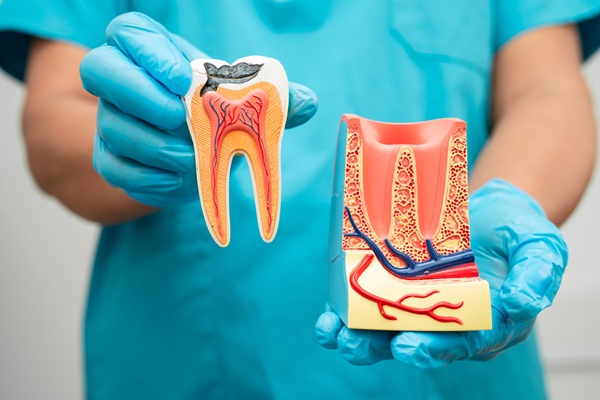Why You Might Require Endodontic Surgery

A dentist may recommend endodontic treatment for various conditions that lead to tooth loss. Endodontic surgery aims to restore the function of natural teeth and prevent the spread of infection.
What is the role of an endodontist?
Endodontists have advanced training in diagnosing and treating tooth pain and conditions that affect the tooth's pulp. In addition, endodontists perform surgery to clear infections from tooth roots that are challenging to locate. Ultimately, endodontists strive to save diseased natural teeth from extraction if doing so does not compromise oral and general health.
Why might an endodontist recommend surgery?
Endodontic surgery can prevent the loss of a natural tooth, which ideally should last a lifetime. However, various conditions that interfere with dental health and longevity may warrant surgical intervention.
Post-root canal infection
A root canal procedure involves removing bacteria within a tooth's pulp; however, dental patients sometimes experience persistent pain and other symptoms following this treatment. Infections in hidden canals that do not appear on X-rays may be responsible for the discomfort. Therefore, an endodontist may use advanced imaging technology to locate the source before making an incision in the gum to access the root tip, reach the pulp, and clear the infection.
Excessive calcium deposits
Calcium can form in root canals due to age or the body's natural response to trauma or decay. Hard calcium deposits can interfere with a dentist's ability to enter narrow channels to find and clear an infection using standard instruments. However, an endodontist can surgically enter through the gum to remove the root tip and locate hidden canals with a high-powered dental microscope and 3D imagining. Then, a precision ultrasonic drill helps the surgeon remove the calcium before addressing the infection.
Dislodged permanent tooth
When trauma causes a tooth to dislodge, it is critical to see an endodontist immediately. An endodontist may reattach the tooth to its socket by splintering it to adjacent teeth if there are no infection signs. Otherwise, replacing the tooth may not be possible, and endodontic surgery may be necessary to remove infection below the gum line and within canals. If part of the natural tooth remains below the gum line, the endodontist can surgically remove it.
Sudden tooth discoloration
Sudden tooth darkening and discoloration may be due to trauma or untreated decay. Regardless of the cause, the tooth is no longer receiving adequate blood flow, causing its nerves to die. Infections may go undetected when teeth with dying nerves no longer cause pain, and saving them can be challenging. Although surgery may be necessary to access and remove the infection below the gum line, an endodontist may also recommend a tooth's removal.
Cracked tooth
Noticeable splits or cracks that extend up the side of a tooth from beneath the gum originate near the root and require prompt treatment by an endodontist. When the damage reaches the chewing surface, bacteria enter the tooth and infect the pulp. Endodontic surgery is necessary to clean out the infection and remove an irreparably damaged tooth.
Conclusion
Various circumstances can compromise oral and dental health. Fortunately, dentists with training to perform endodontic surgery can treat infections and damage that could compromise oral and overall health.
Contact our office today to schedule a consultation with one of our experienced professionals.
Check out what others are saying about our services on Yelp: Endodontic Surgery in Ukiah, CA.
Recent Posts
A person might need to see an endodontist for a wide variety of problems, mainly relating to how they can save patients’ teeth. All endodontists are dentists because they have completed dental school, but they do two more years of specialized study in the techniques used to preserve a person’s dentition. So, if you are…
When a root canal fails, a root canal retreatment must happen. Getting a root canal treatment is better than a dental extraction. If an endodontist sees that your tooth still has good bone support and healthy gums under or around it, a root canal can save the tooth. A root canal is a less expensive…
Tooth pain and dental trauma can be distressing and require immediate attention to prevent further damage and alleviate discomfort. An emergency endodontist specializes in diagnosing and treating severe tooth pain and trauma, offering expert care to save a tooth, relieve pain, and protect long-term oral health. When sudden tooth pain or injury strikes, seeking help…
Tooth pain can stem from various dental issues; one lesser-known cause is a dental root fracture. Root fractures are cracks in the root of a tooth, often resulting from traumatic injury, tooth decay, or other dental conditions. When treated promptly, such as with root canal therapy, patients can avoid significant discomfort and complications. Recognizing the…


